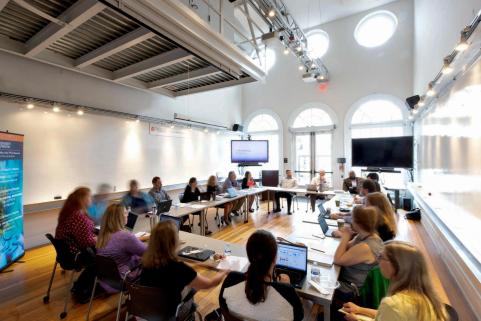Research Support Services
Facilitating groundbreaking, interdisciplinary neuroscience

The Brain Institute offers a range of services to support the development and execution of complex neuroscience research programs.
Brain Institute staff have expertise in grant submissions, regulatory compliance, budget development, program management, coordinating human subjects research trials, and more.
Clinical Translational Research Support
Barriers between fundamental discovery and clinical trials often prevent investigators from advancing new discoveries down the pipeline to patient care. The Brain Institute provides administrative infrastructure to promote interdisciplinary neuroscience research and translate success in the laboratory to trials in humans. Our team has a demonstrated track record in managing large and complex multicenter trials, and we also provide clinical research services to UVA brain researchers who are new to human subjects research.
The scope of services range from consultations to develop your protocol, to assistance with IRB and other regulatory submissions, to enrolling and following human participants in neuroscience studies.
Proposal Development & Submission
The Brain Institute has a team of staff that is able to facilitate the submission of complex, multidisciplinary proposals for extramural funding. We offer specific expertise in project management of the submission process, budget development, and coordinating submissions with faculty from across multiple schools and departments. Our team will work with you to collaborate with other stakeholders across Grounds including your school/department and the Office of Sponsored Programs, as well as with collaborators outside of UVA.
We have previous experience preparing many types of submissions including NIH T32, P20, P30, P50, R25, and U01 submissions, as well as proposals to other extramural funding organizations and foundations.
Research Studios & Grant Workshopping
In collaboration with the integrated Translational Health Research Institute of Virginia (iTHRIV), the Brain Institute welcomes requests for research studios to enhance and refine the conduct of cutting-edge neuroscience research at UVA. A research studio is a novel opportunity for researchers to bring together relevant research experts from diverse academic disciplines to provide feedback on a specific project or area of research to an individual investigator or project team. These sessions may be useful in refining hypotheses and research questions; providing review and feedback of study designs, research methods and grant proposals, and in ensuring the most effective and efficient approaches to successful study implementation.
The Brain Institute also holds several regular meetings where neuroscience researchers can present their research projects informally to a group of gathered investigators for feedback on specific aims, and other aspects of grant development.
Equipment
The Brain Institute supports the purchase of shared instrumentation and equipment that enables the UVA research community access to enhanced research infrastructure. We strongly believe that robust and state-of-the-art infrastructure will amplify the success of our investigators and students.
Examples of prior investments include 3i VIVO Spinning Disk Confocal Microscope, fMRI package for Focused Ultrasound, Siemens Biograph 40 TruePoint PET/CT (mCT) 4th ring, Elixys Flex/Chem radiochemistry system, and Leica Stellaris Confocal System.
Research Cores
Funding from the Grand Challenges Research Investments in Brain and Neuroscience (GCRI-BN) has been allocated to support new neuroscience research cores, including an Animal EEG and Electrophysiology Core and Biomarker & Neuroimaging Core.
Animal EEG and Electrophysiology Core
Diseases and drugs affect animal memory, learning, cognition, anxiety, and mood. The recording of brain rhythms using electroencephalography (EEG) and other modes of electrophysiology serve as a readout for the function of brain networks. With an increasing focus on understanding the development of brain circuits, the demand for this instrumentation is demonstrated. Further, high-throughput, robust phenotyping of animal models is central to moving basic science discoveries into translational studies involving human patients. Testing capabilities that enable the acquisition of these data in neonatal development, motor and sensory assessment, learning and memory, and autism are provided by this core.
Biomarker & Neuroimaging Core
The identification of novel biomarkers and acquisition of high-quality imaging data from research participants - including newborn term and premature infants, children, individuals with dementia and adult/child-caregiver dyads (hyperscanning) is a formidable challenge. Enhancing current human imaging services will enable collection of high-quality structural and functional MRI data, allow for MR scanning that adheres to national standards/protocols for neuroimaging, and generate critically important pilot and proof of principle data. The core will enable a pipeline that connects these human biomarker resources with bench neuroscience researchers in the SOM and across Grounds.
Cohorts
The Brain Institute has established several cohort and research registries and ensures that study protocols meet all human subjects research protections and that enrollment in human subjects studies accurately represent our diverse population. Most human subject, clinical, late-stage translational studies face hurdles in recruiting and retaining participants. Our well-trained and experienced team of research coordinators employ established methods to overcome barriers at all stages of clinical studies.
Events
The Brain Institute is committed to building and sustaining interdisciplinary teamwork to tackle neuroscience problems that affect our society. In service to this mission, the Brain Institute routinely organizes meetings and events to bring together investigators, trainees, and staff from across disciplines to socialize and learn from each other. We believe that genuine, unscripted conversations yield the most powerful partnerships and promote a sense of community that fosters inclusivity and universal success.
Our events range from monthly focus groups dedicated to a specific topic area, to our annual Brain Symposium which brings together hundreds of neuroscience researchers, including local and international leaders in the field. We can support new meetings in emerging focus areas or connect researchers to existing meetings to fit their needs.